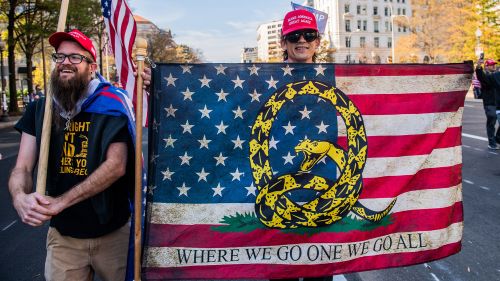What do Americans think of QAnon?

Using social media traffic as a way to gauge interest, it is estimated that hundreds of thousands subscribe to any one of the countless theories propagated under QAnon.
The QAnon Conspiracy Theory
Once largely confined to Internet message boards, the QAnon conspiracy theory has recently been thrust into the mainstream as political candidates sympathetic to it run for office. There is an ever-expanding number of claims that QAnon followers believe in, but President Trump's secret battle against plots orchestrated by the "deep state" is QAnon's central claim.
Using social media traffic as a way to gauge interest, it is estimated that hundreds of thousands subscribe to any one of the countless theories propagated under QAnon. Other estimates, based on the members and followers of QAnon-affiliated Facebook groups and pages, put that number in the millions. This social media traffic combined with an increasing political presence, and even retweets from President Trump linked to accounts associated with the conspiracy theory, suggest that it has a significant following.
The current election cycle has seen more than fifty supporters of QAnon compete for national office with some, like Marjorie Taylor Greene vying for Georgia's 14th Congressional District, winning their primary.
A probability, web-based poll conducted by the Pew Research Center from February 18-March 2 registered low awareness of QAnon. Over three-fourths of those surveyed (76%) responded that they had neither read nor heard anything about the conspiracy theory, including majorities of Republicans (81%) and Democrats (71%). Similar numbers in an online and phone probability survey conducted August 24-26, 2019 by Emerson College expressed no opinion towards QAnon. When asked whether they believe in the conspiracy theory, over seven in ten respondents (73%) noted that they were unsure. Given the general lack of awareness towards QAnon in these results, it is clear that it does not enjoy widespread support among Republicans or Democrats.
Results from a representative, online poll completed on June 23 by the University of Miami also puts the conspiracy theory's following in perspective. Asked to rate their feelings towards QAnon on a feeling thermometer, Americans gave it an average of twenty-four degrees on a scale of 0 to 100, where 100 is the most positive rating. Feelings towards QAnon are similar among Democrats and Republicans: Republicans rated it an average score of twenty-six while Democrats gave it twenty-five.
While these polls show that QAnon enjoys low national support, the strength of the minority belief is still strong enough in some cases to field candidates supportive of it, with at least two slated to win in November.